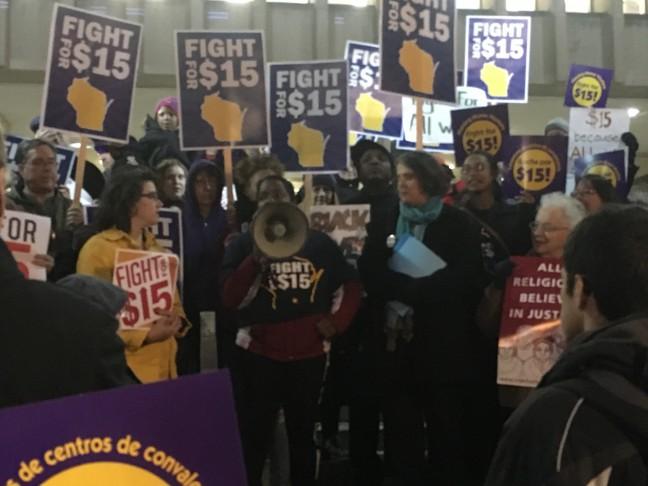University of Wisconsin announced an increase to student minimum wage to $9 an hour, but student organizations on campus argue the increase is not enough to offset the expenses of college living.
At UW there are approximately 10,000 student employees, and more than 5,300 graduate students, according to UW statement. Beginning in September 2016, minimum wage for student workers will increase approximately $3. Prior to that increase, graduate students will receive a 2 percent increase July 1.
Since 2009, UW’s student minimum wage has sat at $7.25 an hour. The minimum wage increased to ensure the university was in compliance with federal requirements, after federal and state minimum wage increased in July 2009, UW Senior Director of Operations at the Office of Human Resources Mark Walters said.
The increase, Walters said, is meant to help students pay for various costs, such as housing, food or other living expenses.
But Danny Levandoski, a UW junior and member of the Student Labor Action Coalition, said the increase from $7 to $9 is not enough, and student minimum wage should be increased to $15.
Though Levandoski said student workers and student organizations appreciate the university’s efforts to increase student wages, he called the increase “a political move” on UW Chancellor Rebecca Blank’s part.
UW “cuts corners” all the time to save money, he said, but the money saved is not being given back to students. The money instead funds remodeling projects, like for Witte residence hall, which has plans to undergo major updates in 2017-19.
“People like to say that we are students first, but we have real living expenses like groceries, and on top of that we have tuition and books to pay for,” Levandoski said. “There’s just so much that goes into being a student.”
Samuel Park, sophomore member of SLAC and the Working Class Student Union, said the increases show that the entire campus — student workers and student organizations — were in favor of changing the minimum wage, and the increase to $9 demonstrates their hard efforts.
But Park echoed Levandoski that the increase is not enough. Some students on campus are homeless and can’t even afford basic living expenses, which Park said is “completely unacceptable.”
In addition, Park said most student workers will barely be affected by the increase, as already they may be being paid about $8.
But while wages are meant to help students pay for living expenses and the wage increase is meant to help students with additional costs, they are not meant to be entirely used to pay for tuition and textbooks, Walters explained.
“The student hourly positions are never meant to pay for someone’s college education,” Walters said. “As far as being the primary source, it’s supposed to defray the cost of living expenses and tuition and housing.”
Furthermore, Walters said an increase of student wage to $15 would require money to come from a secondary source, like an increase in segregated fees. Some of the student workers, like those that work for recreational sports, are funded through segregated fees, so an increase in segregated fees would be needed to increase pay in student wages.
An increase in wages would therefore possibly mean an increase to student segregated fees, Walters said.
“I know there has been a lot of discussion about raising the wage to $15, but we have to balance providing a higher wage to what the cost is going to be,” Walters said.
Park said the university likes to “preach” that budget cuts prevent them from raising the minimum wage. But he said other universities like the University of Washington have been able to raise student minimum wages to $15, understanding the importance of ensuring student workers receive a wage they may live off of despite the cost.
The university needs to shift its focus to be more orientated to student needs, Park said.
Student organizations like SLAC, Working Class Student Union and Associated Students of Madison have been working together to further increase the student wage to $15, Levandoski said.
“This has been an issue for many, many years, and it’s a shame that it’s only starting to get looked at,” Levandoski said.


